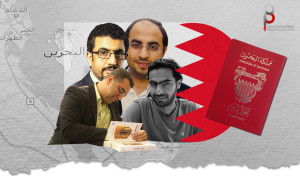Bahrain Press Association: Restoring the journalists’ revoked citizenships is an expected justice and a step towards ending the crisis

Since the outbreak of popular protests in Bahrain in 2011, the government has adopted violent security and legal measure to confront the complicated political scene. Denaturalization/revocation of citizenship is one of those measures. It has been used in a downright breach of constitutional legal rights—inhumane decisions that deprive people of their most basic rights and the sense of belonging to their homeland.
Four journalists are among the victims of revocation of citizenship: researcher Dr. Ali Al-Dairy, journalist Abbas Bu Safwan, activist and blogger Ali Abdel-Imam and blogger Hussein Youssef. The Minister of Interior, Sheikh Rashid bin Abdullah Al Khalifa, ordered their revocation of citizenship in mid-January 2015 among a list of 72 Bahrainis, most of whom are political and human rights activists.
The four journalists
In addition to his authored books and published articles on cultural and intellectual issues, Dr. Ali Al-Dairy wrote for the Bahraini newspapers Al-Ayyam and Al-Waqt before their closure in 2010. He also wrote for the Lebanese newspaper Al-Akhbar after he was forced to leave Bahrain in March 2011 and settled in Beirut. Al-Dairy is currently living in exile in Canada.
Abbas Bu Safwan worked as a journalist and writer for years in a number of Bahraini newspapers. He worked for Al-Wasat, Al-Ayyam and Al-Waqat newspapers. He also founded the Aswaaq economy newspaper, which he headed as editor-in-chief until 2011. He was forced to leave the country after the protests were suppressed to settle in London. He currently presents TV programs broadcasting from London and writes periodically for the Lebanese newspaper Al-Akhbar.
Ali Abdel-Imam is the founder of the Bahrain News Forum (Bahrain Online). In 2005, he was arrested along with Hussein Youssef for running the website. However, they were later released due to local and international pressures. Abdel-Imam was arrested again in August 2010 and was tortured during his detention. Finally, he was released under the pressures of popular protests in early March 2011.
After suppressing the democratic protests in mid-March 2011, security authorities attempted to arrest him, but he remained a fugitive until a military court sentenced him to 15 years in prison in absentia for his journalist activity. Abdel-Imam managed to escape from Bahrain in May 2013 and went to Britain, where he still resides.
Similarly, Hussein Youssef left Bahrain in February 2011 to protect himself from the risk of being arrested again. He had settled in Beirut temporarily before moving to exile in Canada.
The government is called upon to stop the suffering of the denaturalized
Six years have passed, and those journalists and others are suffering from citizenship revocation, for reasons, to say the least, that were retaliatory and arbitrary. Journalists were subjected to frequent harassment and trouble for arbitrary decisions that deprived them of the right to live in their homeland.
With the recent government decisions and initiatives that included releasing hundreds of convicts under the Alternative Penal Code, it has become imperative that the government reconsiders such arbitrary decisions that were the result of complex political conditions. Among those is the decision to revoke the citizenship of the four journalists, and rehabilitating and compensating them for their suffering.
The revocation of the citizenship of the four journalists was a shock and a sheer violation of the constitution. Journalists and their families encountered many challenges inside and outside Bahrain, in addition to the psychological harm they suffered.
Neither the journalist nor anyone else should fear reprisals from the government or any sort of ill-treatment for exercising their right to freedom of expression. Restoring the of Al-Dairy, Bu Safwan, Abdel-Imam and Youssef and dropping lawsuits against has become an urgent necessity to establish their rights and demonstrate the government’s desire to turn the page on the political crisis and overcome it. This decision will certainly be welcomed by various local and international organizations and institutions.